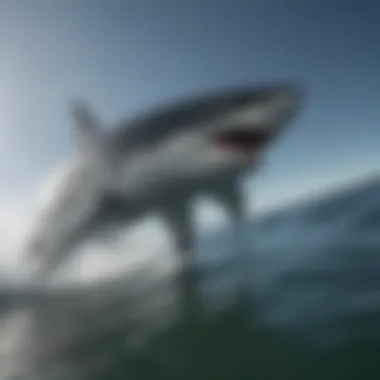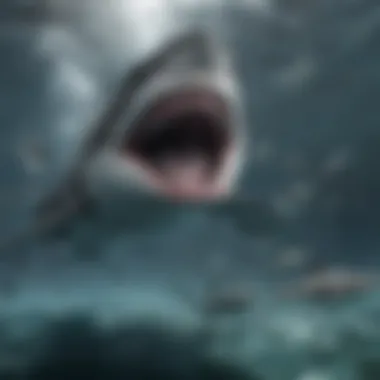Unveiling the Predatory Realm: Are Sharks Truly Apex Predators?


Surfboarding Techniques
Sharks, often stereotyped as relentless predators of the ocean, command both fear and fascination among marine enthusiasts. The essence of their predatory behavior, intricately woven into the marine ecosystem, prompts us to delve deeper into their world to unveil the layers of complexity in their role. Are sharks truly the apex predators we perceive them to be, or is there more beneath the surface? Through unraveling their behaviors, feeding habits, and ecological significance, we embark on a journey to demystify the predatory nature of sharks.
Types of Waves
Diving beneath the surface of the ocean, sharks navigate a realm of diverse waves akin to the varying challenges a surfer encounters. Just like the waves shape surfing experiences, the types of waves in the ocean contribute to the hunting strategies and movements of sharks. Understanding these wave dynamics sheds light on the tactical prowess of these marine creatures.
Pop up Technique
Similar to a surfer swiftly rising to stand on a board, sharks exhibit a calculated finesse in their approach to prey interception. The pop up technique, synonymous with surfer agility, mirrors the speed and precision with which sharks propel themselves towards unsuspecting targets, showcasing their predatory acumen in action.
Bottom Turn Maneuver
In the world of surfing, executing a seamless bottom turn marks a surfer's mastery of wave dynamics. Likewise, sharks demonstrate their skill in swiftly changing direction during pursuit, executing precise bottom turns to maintain the chase. Delving into this maneuver unveils the strategic prowess embedded in their predatory pursuits.
Duck Diving
Surfers employ the duck diving technique to navigate through challenging waves, submerging gracefully to overcome obstacles. Sharks, too, employ a similar tactic, utilizing their streamlined bodies to dive swiftly beneath the tumultuous surface. Examining this technique illuminates the grace and agility behind their predatory endeavors.
Cutback
Just as a skilled surfer executes a fluid cutback to carve through waves, sharks display a comparable finesse in their lateral movements. The cutback, symbolizing precision and control, embodies the calculated maneuvers sharks employ to outmaneuver prey, highlighting their calculated approach in the oceanic realm.
Introduction


Marine ecosystems hold a delicate balance that hinges on the intricate interactions between various species. At the core of this complex web of life are predators – the apex hunters that shape the dynamics of the oceanic world. In this article, we embark on a deep-sea journey to unravel the enigmatic nature of sharks and ponder upon the age-old question: Are sharks truly the unrivaled predators of the marine realm? By dissecting their behaviors, foraging patterns, and ecological impacts, we aim to decipher the true essence of these oceanic marvels. Delving beyond mere appearances, we seek to navigate through the depths of understanding, shedding light on the multifaceted role that sharks play in the grand scheme of marine biodiversity.
As the curtain rises on this exploration, we are beckoned to peer beneath the waves and behold the mesmerizing world of sharks in its full splendor. What secrets lie hidden within their sleek silhouettes and razor-sharp instincts? What tales do their ancient lineage and survival strategies whisper to those who dare to listen? Through a meticulous examination of their symbiotic relationships within the marine ecosystem, we are poised to unravel the intricate tapestry of predator-prey dynamics that govern the oceanic domain.
Prepare to be captivated as we untangle the web of misconceptions surrounding sharks, dispelling myths to unearth truths that have long been shrouded in mystery. Together, we will navigate through the murky waters of media sensationalism and delve into the reality of these oceanic guardians. Join us on this intellectual voyage as we navigate the choppy waters of perception and dive deep into the realm of scientific inquiry, endeavoring to separate fact from fiction, myth from reality.
In a world where perceptions often skew reality, our quest for knowledge emerges as a guiding beacon, illuminating the path towards a deeper comprehension of the marine biosphere. So, grab your virtual snorkel and plunge into the depths of discovery alongside us, as we unravel the captivating enigma of sharks' predatory prowess.
Defining Predators in the Marine World
The exploration of predators in the marine realm is a crucial endeavor within the broader scope of understanding marine ecosystems. Predators play a pivotal role in maintaining ecological balance and diversity, serving as key regulators of population dynamics. By delineating the defining characteristics that set predators apart in the marine world, we gain valuable insights into the intricate web of life beneath the waves.
Characteristics of Predators
Predators in the marine world exhibit a range of specialized traits that distinguish them as top-tier hunters. Adaptations such as keen senses, streamlined bodies, and razor-sharp teeth equip these predators for success in capturing prey. Their predatory behaviors often display strategic prowess and efficiency, honed through millennia of evolution to ensure survival in the competitive underwater environment.
Ecological Significance of Predators
The ecological importance of predators transcends mere hunting activities; predators act as linchpins in marine food webs, influencing the distribution and abundance of species throughout the ecosystem. Predators help control prey populations, preventing overgrazing that could destabilize entire habitats. Furthermore, their presence can shape the behavior of other species, creating a cascade effect that ripples across trophic levels, ultimately influencing ecosystem resilience and sustainability.
Sharks: The Apex Predators of the Ocean?
Sharks, the apex predators of the ocean, play a fundamental role in marine ecosystems. Their presence not only regulates marine populations but also indicates the health of the seas. Sharks exhibit a wide range of behaviors and characteristics that establish them as top predators. Their ability to adapt to various environments and hunt efficiently makes them vital to maintaining the balance of oceanic life. In this section, we will delve deep into the specifics of why sharks are considered the apex predators of the ocean, shedding light on their unique prowess and ecological significance.
Diverse Species of Sharks


Diverse species of sharks contribute significantly to the marine ecosystem. Each species has distinct characteristics that allow them to thrive in different environments and fulfill specific roles in the food chain. From the massive Great White Shark to the elusive Hammerhead Shark, the variety of shark species underscores their adaptability and evolutionary success. Understanding the diverse species of sharks is key to comprehending the complex web of interactions within marine ecosystems. Despite facing dangers such as overfishing and habitat loss, these sharks remain essential for maintaining the marine biodiversity.
Specialized Hunters
Sharks are known as specialized hunters due to their unique adaptations for hunting and capturing prey. Their keen senses, swift movements, and specialized teeth enable them to excel as hunters in their respective niches. Whether it's the lightning-fast Mako Shark or the stealthy Tiger Shark, each shark species has honed specific hunting techniques over millions of years of evolution. By exploring the world of specialized hunter sharks, we gain insight into the remarkable diversification of predation strategies in the marine environment.
Shark Feeding Behavior
Shark feeding behavior is a fascinating study that encompasses various predatory strategies and feeding habits. Sharks have evolved to efficiently locate, capture, and consume prey in different marine habitats. Understanding their predatory strategies sheds light on the dynamics of marine food chains and the intricate balance of predator-prey interactions. By analyzing their feeding behavior, we can unravel the mysteries behind sharks' role as top predators.
Efficient Predatory Strategies
Efficient predatory strategies are at the core of sharks' success as apex predators. Their ability to optimize energy expenditure during hunting and feeding processes sets them apart as efficient predators in the ocean. From ambush predation to persistence hunting, sharks employ a range of strategies tailored to their ecological niche. Exploring the efficiency of their predatory tactics provides valuable insights into the sustainability of marine ecosystems and the delicate balance of predator and prey populations.
Top Predators or Opportunistic Feeders?
The debate surrounding whether sharks are top predators or opportunistic feeders is multifaceted. While sharks hold a top position in the marine food chain, their feeding habits also exhibit opportunistic behaviors based on resource availability. By examining the fine line between being apex predators and opportunistic feeders, we gain a deeper understanding of sharks' ecological roles and their impact on marine biodiversity. Balancing their position as top predators with opportunistic feeding behaviors highlights the complexity of their ecological niche.
Role of Sharks in Marine Ecosystems
Sharks play a crucial role in maintaining the balance of marine ecosystems. Their presence influences the population dynamics of various species and helps regulate the health of the oceans. Understanding the specific roles sharks play in marine ecosystems is essential for conservation and sustainable management practices. By uncovering the intricacies of their ecological impact, we can appreciate the interconnectedness of species in the marine environment and the importance of preserving shark populations.
Impact on Food Chains
Sharks' impact on food chains is profound, as they act as keystone species in regulating marine populations. By preying on weaker individuals, sharks contribute to maintaining species diversity and preventing overpopulation of certain prey species. Their role in shaping marine food webs underscores the critical role they play in ecosystem stability and resilience. Exploring the impact of sharks on food chains provides a holistic view of their significance in marine ecosystems.


Ecosystem Stability
Ecosystem stability relies on the presence of apex predators like sharks to maintain a balanced ecosystem. Sharks help control the populations of mesopredators, which in turn affects lower trophic levels and ensures the health of ecosystems. Their predatory influence cascades through the food chain, influencing marine biodiversity and ecosystem resilience. By examining the role of sharks in promoting ecosystem stability, we gain insight into the intricate mechanisms that govern marine habitats and the importance of conservation efforts to protect these apex predators.
Misconceptions About Sharks
Throughout the vast discourse on marine biology, an essential area of focus pertains to dispelling misconceptions surrounding sharks. In the grand narrative of the animal kingdom, sharks have often been maligned as ruthless predators, lurking in the depths to strike fear. Understanding these misconceptions is crucial in deciphering the intricate dynamics of the marine world. By unraveling the truths and falsehoods associated with sharks, we pave the way for a more enlightened perspective on these majestic creatures.
Media Portrayal vs. Reality
Myth of Mindless Killers
In the canvas of media representation, one prevailing myth that permeates public perception is the portrayal of sharks as mindless killers. This notion, deeply ingrained in popular culture, emphasizes the predatory nature of sharks without delving into the complexities of their behaviors. By scrutinizing this myth, we unearth a captivating dichotomy between reality and fiction, elevating the discourse on marine conservation.
Sharks as Vital Predators
Contrary to the sensationalized image of mindless killers, sharks stand as vital predators in the delicate balance of marine ecosystems. Their role transcends mere predation, encompassing a nuanced web of interactions that regulate underwater biodiversity. Recognizing sharks as vital predators sheds light on their intrinsic value in maintaining the health and stability of aquatic environments, debunking misconceptions propagated by mainstream media.
Conservation and Protection Efforts
Shark Conservation Programs
Efforts to safeguard shark populations have birthed a wave of conservation programs aimed at preserving these iconic species. These initiatives pivot on scientific research, community engagement, and policy advocacy to mitigate the threats faced by sharks. By probing into the core tenets of shark conservation programs, we unveil a collective dedication to nurturing marine biodiversity and fostering sustainable coexistence between humans and sharks.
Human-Wildlife Conflict Resolution
Navigating the intricate terrain of human-wildlife conflicts, particularly concerning sharks, necessitates a nuanced approach rooted in conflict resolution strategies. Balancing the needs of local communities and the preservation of natural ecosystems requires a delicate equilibrium. By elucidating the mechanisms of human-wildlife conflict resolution within the context of shark conservation, we embark on a path towards harmonious cohabitation and mutual respect between diverse stakeholders.
Conclusion
As we culminate this comprehensive exploration into whether sharks are truly apex predators in the marine world, it becomes evident that understanding their role is crucial for ecological balance. Throughout this article, we have dissected the complexities of shark behavior, feeding habits, and their significance in marine ecosystems. The importance of this analysis lies in its potential to reshape misconceptions and promote informed conservation efforts. By shedding light on the nuanced nature of sharks as vital predators, we pave the way for a deeper appreciation of their crucial role in maintaining the health of our oceans. This examination not only highlights the need for continued research and conservation programs but also underscores the delicate balance that underpins our marine environments. In this conclusion, we emphasize the critical need for a harmonious coexistence between humans and sharks, recognizing the irreplaceable value that these creatures bring to our planet's delicate web of life.







